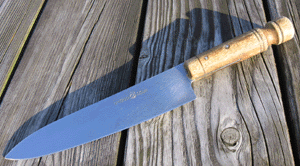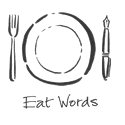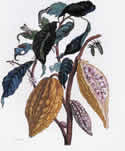Sharpness is all

My favourite knife
As I came out of my office this morning to walk around the corner to the house for a spot of lunch (the two buildings are conveniently adjacent), I heard the insistent grind of the knife sharpener. Every four weeks, this itinerant business, called 'The Happy Edge' comes to our town, parks up just around the corner from us beside Topsham quayside, opens the tailgate of the small van, and sets to work. The business is aptly named: Ian, the knifesharpener, is a seemingly always cheerful fellow and he clearly enjoys his work. All the restaurateurs make their way here (or else he goes and fetches their knives, carrying them carefully on a tray) and he settles in for a good few hours, grinding and sharpening knives, cleavers, food processor blades, scissors. As he grinds, the sparks fly off the fast-spinning, coarse-stone wheel and knives blunted from honest use are restored to perfect sharpness once again.
How often do knives need sharpening? The chefs have them done every four weeks, Ian tells me. For home use, maybe every three to six months is enough, he added. I probably go to him far less frequently than that, using a domestic knife sharpener in between times. But it's true: at some point knives simply don't respond to such home remedies and there is no other option but to have them professionally reground and sharpened.
And why not? There is something hugely satisfying in seeing the carbon steel blade of a knife gradually alter in form and shape, its ground-down wear marking the years of use in the preparation of countless meals enjoyed. And indeed, for just a pound a knife, the pleasure of having a rackful of professionally sharp knives at hand is immense! Notoriously tough-skinned tomatoes can be cut into the finest dice; herbs and leafy vegetables are transformed into a chiffonade in an effortless jiff; meat slices like butter: we julienne to our hearts' content.
It's not just a question of efficiency and ease of effort, either. Sharpness is a happy state of mind. It indicates that we are on the ball, quick-witted, on top of things. "He's really sharp," we say, about someone who is nobody's fool. The striker who never misses a chance in front of goal is said to be "razor sharp". "Cutting edge" technology is absolutely up-to-the-minute, state-of-the-art. Being "on the knife edge", on the other hand, is a dangerous and exhilarating equilibrium wherein you could fall either way to your doom should you stray off the straight and narrow, the precarious knife edge of existence. Like a knife, we whet our appetite, sharpening it in the happy anticipation of eating something inexpressibly delicious.
Knives, too, become an extension of ourselves. Certainly for your average garden-variety hoodlum, choice of knife may say alot about who you are: Size undoubtedly matters! But even for the rest of us, we all have our favourite, the knife that we - and we alone - always feel most intuitively comfortable with. Kim prefers a lovely stainless steel fish filleting knife for most all general use: it is the knife she automatically reaches for. For me, though, the blade is just way too flexible, not solid enough. I rarely if ever use it. I wonder, is this because Kim is by nature at once delicately fine as well as flexibly accommodating? Nello once gave me his favourite knife, a Victorinox paring knife that is as unbending and firm as Kim's is bendy. Nello's is excellent when it has a sharp edge, but being stiff and made from much thicker metal, it seems to lose its sharpness more quickly than others. Nonetheless I love it all the same, not least for the memories: or is it just because I'm dull?
My Korean grandmother once told me it is bad luck to give someone a knife. Once she gave her daughter-in-law a knife and, said Halmoni, she - the daughter-in-law - forever turned against her. On another occasion, Halmoni gave a friend a knife and afterwards she never felt the same towards the friend. After we had spent some months working together with Halmoni preparing our book "Flavours of Korea with stories and recipes from a Korean grandmother's kitchen", she wanted to give me her favourite knife, a touching and thoughtful present from one not naturally given over to such gestures. "First," she demanded, "You pay me one dollar." Perplexed, I handed over the bill. "There," she sighed with relief, "I sold you my knife. Now there will be no bad blood between us."
Halmoni's is still the knife I use - I reach for - just about every day of my life. I cut, I chop: therefore I am. And now, thanks to Ian and the Happy Edge, that favourite blade, forever linked to my past, to my very identity, is once again restored to perfect sharpness.



2 Comments:
That's fascinating, Lisa. I never knew this knife superstition was/is cross-cultural. Does anyone else know if this happens anywhere else in the world?
I suppose knives are deeply symbolic and powerful items, and have been since the deepest dawn of civilisation. Perhaps even a cause of civilisation - man's mastery of weapons for hunting, tools for agriculture. Indeed the mysterious civilisation of the Teotihuacanos had as its economic base the production of obsidian knives which were traded as far as Guatemala, knives that were used both for everyday purposes as well as for ceremonial heart sacrifice.
Now we know what not to get our young friends for a wedding present!
Speaking of knives and regional and individual identity, when we were in Sardegna, I needed a picnic knife for the pecorino and salami and great loaves of bread we'd hoik with us on walks in the rugged Aspromonte. So I purchased a Sardinian shepherd's pocket knife from some little shop in the middle of nowhere. I happily used it while there, and thought nothing of it. It was very effective and handsome. Now, I still occasionally take it on picnics with me here in England. Shock and awe whenever it comes out of my pocket! Believe me, this baby is serious: simply functional and deadly, with a now well polished (from my pocket) olive wood casing, and a razor sharp blade about 4 inches long with a frighteningly pointed tip that would easily pierce to the heart. Not just a tool for carving off hunks of bread and cheese but a lethal weapon that would and could kill!
I suppose this inland part of the island was always considered something of a lawless land where brutal kidnappers would hide out with their victims, sometimes despatching parts of the bodies to the waiting families, no doubt cut off with a similar knife as my own. It does make you shudder! It does make you careful when cutting hard cheese (one slip, and there's your finger gone...)
Post a Comment
<< Home